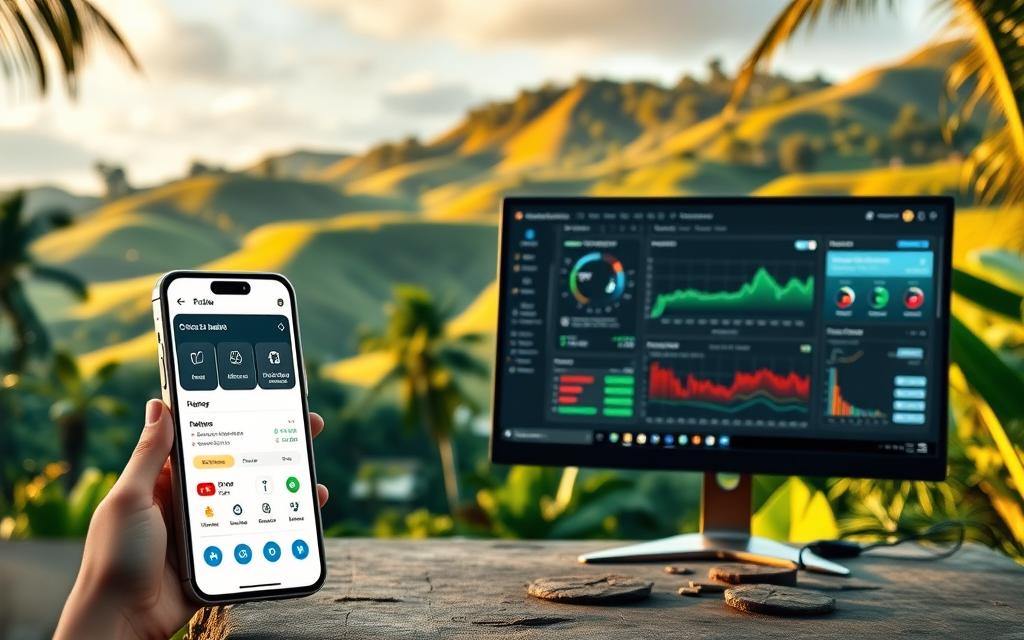Top Banks for Digital Nomads in Costa Rica: 2023 Guide

Did you know Costa Rica ranks among the top 20 countries globally for quality of life? This tropical paradise attracts thousands of individuals and families each year, thanks to its stunning landscapes, mild climate, and welcoming culture. Whether you’re seeking permanent residency, rentista status, or investment opportunities, Costa Rica offers diverse options to suit your lifestyle.
For those working remotely, the country’s banking system has adapted to meet unique needs. Many institutions now provide 24/7 support, multi-currency accounts, and low fees, making it easier to manage finances while enjoying the pura vida lifestyle. Whether you’re opening a bank account or exploring residency benefits, Costa Rica’s financial innovation ensures a seamless experience.
In this guide, we’ll dive into the essentials of banking in Costa Rica, highlighting key features and benefits tailored to your needs. From understanding residency options to navigating account setup, we’ve got you covered with accurate, up-to-date information.
Overview of Digital Nomad Banking Needs

Living a nomadic lifestyle requires banking solutions that adapt to your global needs. For remote workers, managing finances across borders can be challenging. That’s why flexible banking options are essential for maintaining financial stability while exploring new destinations.
Understanding Global Flexibility and Access
Digital nomads need banking platforms that offer seamless access to their money, no matter where they are. Mobile apps and online platforms have revolutionized how remote workers manage their finances. These tools provide real-time updates, multi-currency management, and instant transfers, making it easier to stay on top of your budget.
However, not all banks cater to these needs. Traditional institutions often impose high fees and suboptimal exchange rates on international transfers. This can add unnecessary costs to your lifestyle. For those considering residency in Costa Rica, finding a bank with transparent fees and global accessibility is crucial.
Key Financial Challenges for Remote Workers
One of the biggest hurdles for digital nomads is navigating the complexities of international banking. High fees and poor exchange rates can quickly eat into your budget. Additionally, the lack of 24/7 customer support can make it difficult to resolve issues promptly.
To overcome these challenges, many remote workers turn to modern banking solutions. These platforms offer low or no fees, competitive exchange rates, and round-the-clock support. Whether you’re sending money abroad or managing multiple currencies, these features ensure a streamlined process.
For more insights on how to navigate these challenges, check out our guide on work permits for foreigners in Costa. This resource can help you better understand the financial and legal aspects of living in this beautiful country.
Digital banks like Wise and Revolut are popular among nomads. They offer multi-currency accounts, low fees, and global access. For example, Wise provides transparent exchange rates, while Revolut supports over 30 currencies. These features make managing money across borders seamless.
Local banks also provide excellent services for expats. Many offer dual currency accounts and competitive exchange rates. However, traditional banks may have higher fees for international transfers. It’s important to compare these options to find the best fit for your lifestyle.
Customer service is another key factor. Digital banks often provide 24/7 support, which is crucial for resolving issues quickly. Traditional banks may have limited hours but offer in-person assistance. Testimonials from other nomads highlight the importance of reliable support.
Our methodology for ranking banks focuses on fees, accessibility, and customer satisfaction. We consider real-life experiences and case studies to ensure our recommendations are practical. For more insights on residency and financial planning, check out our guide on residency in Costa Rica.
Rentista, Investment, and Permanent Residency Insights
The rentista visa requires a monthly income of at least $2,500 for two years. This option is ideal for those with stable foreign income. For investors, the inversionista visa demands a minimum investment of $150,000 in sectors like real estate or tourism. Permanent residency, on the other hand, offers long-term stability but requires regular renewals.
Each residency type affects your ability to open an account. Some banks require proof of legal residency, while others, like Banco de Costa Rica, allow non-residents to open accounts with limited features. Knowing your residency status helps streamline the process.
Compliance with Costa Rica’s Financial Regulations
Costa Rica’s banking system adheres to strict anti-money laundering practices. This means expats must provide legitimate proof of income and source of funds. Documentation typically includes a passport, proof of address, and sometimes a reference letter from a previous bank.
Recent trends show that the system is adapting to international standards. For example, since 2016, Banco de Costa Rica has made it easier for non-residents to open accounts. However, account limitations may apply, such as restrictions on certain transactions.
Understanding these regulations ensures compliance and avoids delays. Whether you’re managing a business or personal finances, staying informed about the legal framework is crucial for a smooth banking experience in Costa Rica.
Digital Banking Features and International Accessibility

The rise of digital banking has transformed how remote workers manage their finances globally. For those living a nomadic lifestyle, having reliable and flexible banking solutions is essential. Modern platforms cater specifically to these needs, offering tools that simplify money management across borders.
Mobile Apps and Online Platforms
Digital banking platforms like Revolut and Wise have revolutionized the way users handle their money. These apps allow you to deposit checks, transfer funds, and manage cards instantly. With multi-currency support, you can hold and exchange currencies at competitive rates.
Real-time notifications keep you updated on transactions, while rapid international transfers make it easy to send money abroad. These features eliminate the need for branch visits, making banking accessible from anywhere in the world.
24/7 Global Customer Support
One of the standout features of digital banking is round-the-clock customer service. This is particularly valuable for digital nomads who may be working across different time zones. Whether you need help with a transaction or have questions about your account, support is always available.
Traditional banks often have limited hours, which can be inconvenient for remote workers. Digital platforms, on the other hand, ensure that assistance is just a click away, providing peace of mind for users.
By leveraging these features, expats and remote workers in Costa Rica can enjoy a seamless banking experience tailored to their unique needs.
Comparing Account Fees, Exchange Rates, and Benefits

Choosing the right bank account involves understanding fees, exchange rates, and benefits. For remote workers, these factors can significantly impact financial stability and convenience. Transparent fee structures and favorable rates are critical for managing money across borders.
Low or No Fee Advantages
Many modern banking platforms, such as Wise and Revolut, offer low or no fees for international transactions. Traditional banks often charge high fees for foreign transfers and monthly maintenance. These hidden costs can add up quickly, especially for those managing multiple currencies.
Digital banks typically use the mid-market exchange rate, which is more favorable than traditional bank rates. This can save significant money on international transfers. For example, Wise charges minimal fees and provides transparent pricing, making it a popular choice among remote workers.
Dual Currency and Exchange Rate Benefits
Dual currency accounts allow users to hold and manage funds in multiple currencies. This feature is particularly useful for those who frequently travel or work across borders. It eliminates the need for constant currency conversion, reducing costs and simplifying money management.
Exchange rate margins can vary widely between banks. Digital platforms often offer competitive rates, while traditional banks may impose higher margins. By choosing a bank with favorable rates, you can save money on every transaction.
For instance, Revolut supports over 30 currencies and provides real-time exchange rates. This flexibility ensures that users get the best value for their money, whether they’re sending funds abroad or making everyday purchases.
Exploring Regional Banking Options for Nomads
Global banking solutions vary widely, offering unique advantages for remote workers. For those who travel frequently or live abroad, understanding regional banking practices is essential. This section compares services from the US, Europe, Canada, and Australia, highlighting how they cater to expats and remote workers.
Insights from US, European, Canadian, and Australian Providers
In the US, banks like CapitalOne provide robust online platforms and low fees for international transactions. These features make it easier for remote workers to manage their finances across borders. European providers, such as N26 and Monzo, are known for their user-friendly mobile apps and competitive exchange rates.
Canadian banks like Simplii Financial offer dual currency accounts, which are ideal for those who frequently travel or work in multiple countries. Australian banks, on the other hand, focus on seamless integration with global payment systems, ensuring quick and secure transfers.
Each region has its own regulatory environment, which influences service quality and accessibility. For example, European banks often have stricter compliance requirements, while US banks prioritize customer convenience. Understanding these differences can help you choose the right platform for your needs.
International platforms like Wise and Revolut allow seamless transfers between currencies, making them popular among expats. These services often provide 24/7 customer support, ensuring that help is always available, no matter where you are in the world.
For more insights on financial planning as an expat, check out our guide on tax implications for digital nomads in Costa. This resource can help you navigate the complexities of managing finances while living abroad.
Navigating the Banking Process in Costa Rica
Opening a bank account in Costa Rica is a straightforward process if you know the steps. Whether you’re an expat or a remote worker, understanding the requirements can save you time and effort. The system is designed to accommodate both residents and non-residents, though the process may vary slightly depending on your status.
Documentation and Proof of Residency
To open an account, you’ll need specific documents. These typically include a valid passport, proof of address, and an initial deposit. For residents, proof of legal residency, such as a visa, is also required. Non-residents can sometimes open limited accounts, but these may have restrictions on transactions.
It’s important to prepare all necessary paperwork in advance. This helps avoid delays and ensures a smooth application process. Some banks may also require a reference letter from your previous bank or proof of income. Double-check these requirements with your chosen institution to save time.
Managing the initial deposit is another key step. The amount varies by bank, so it’s wise to compare options. Some institutions may waive this fee for certain account types. Understanding these costs upfront can help you make an informed decision.
Each bank’s system may differ based on business practices and regulatory requirements. For example, some banks offer online applications, while others require in-person visits. Local support and language assistance can also play a crucial role in smoothing the process.
For more detailed guidance on residency and financial planning, check out our guide on how to apply for the Costa Rica pensionado. This resource provides valuable insights into navigating the financial landscape as an expat.
Innovative International Transfer and Money Management Solutions
Innovative tools are transforming how we handle international transfers and currency exchange. For remote workers, managing finances across borders requires efficient solutions that save time and reduce costs. Advanced platforms now offer features like real-time conversion calculators and automated fee minimization strategies, making it easier to stay on top of your money.
Efficient Currency Conversion Strategies
Currency exchange can be costly if not managed properly. Modern platforms like Wise and Revolut use the mid-market exchange rate, ensuring you get the best value for your money. These tools allow you to hold, spend, and send funds in multiple currencies, eliminating the need for constant conversions.
Real-time notifications keep you updated on exchange rate fluctuations, helping you make informed decisions. For example, Wise supports over 40 currencies and provides local bank details in nine major ones. This flexibility ensures seamless transactions, whether you’re sending money abroad or making everyday purchases.
Minimizing Foreign Transaction Fees
High fees can quickly eat into your income, especially when working across borders. Digital platforms like TransferGo and OFX offer low-cost transfer options, with some even providing fee-free choices based on urgency. These services often include automated strategies to minimize costs, such as bundling transfers or using favorable exchange rates.
For instance, Wise charges minimal fees and ensures 93% of transfers arrive within a day. By choosing the right platform, you can significantly reduce overall banking costs and improve your financial planning. These solutions are designed to support a dynamic lifestyle, ensuring you can focus on your work without worrying about hidden fees.
Tips for Choosing a Bank That Fits Your Digital Nomad Lifestyle
Selecting the right financial partner is crucial for maintaining flexibility and security while living abroad. As a remote worker, your bank should offer features that align with your unique needs. This guide provides practical tips to help you make an informed decision.
Evaluating Service Features and Security Measures
When choosing a bank, prioritize platforms with user-friendly mobile apps and 24/7 customer support. These features ensure you can manage your account from anywhere in the world. For example, platforms like Charles Schwab and Monzo are known for their ease of use and accessibility.
Security is another critical factor. Look for banks that offer two-factor authentication and real-time monitoring. These measures protect your funds from unauthorized access. Additionally, some platforms provide instant notifications for every transaction, giving you peace of mind.
Comparing fees and exchange rates is also essential. Many digital banks, such as CapitalOne 360, offer low or no fees for international transactions. This can save you significant money over time. Always check for hidden costs and ensure the exchange rates are competitive.
Finally, consider both your immediate needs and long-term goals. A bank that supports multi-currency accounts and offers robust financial tools can help you plan for the future. By evaluating these factors, you can find a financial partner that supports your lifestyle and work requirements.
Conclusion
Efficient banking solutions are key to thriving in a dynamic, borderless world. Costa Rica’s financial institutions provide tools tailored to the needs of modern professionals, ensuring seamless money management across borders. Whether you’re managing multiple currencies or seeking low fees, the right account can simplify your financial life.
This guide has highlighted the importance of choosing a bank that aligns with your lifestyle. From digital platforms to local options, Costa Rica offers diverse services that cater to remote workers. By making informed decisions, you can optimize your finances and reduce unnecessary costs.
We encourage you to review the detailed comparisons and tips provided. Building a secure financial future while enjoying an adventurous lifestyle is within reach. For ongoing updates and expert insights, join our community and stay informed about the latest in global banking solutions.


